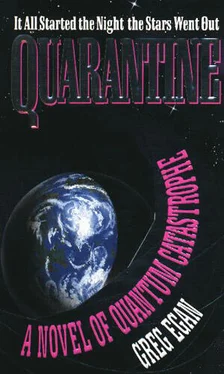'What's that got to do with smearing?'
'How do you split a laser beam in two? You point it at a sheet of glass with a very thin coating of silver, angled at forty-five degrees to the beam; half the light is reflected to the side, while the rest passes straight through. But when I say "half the light is reflected," I don't mean every second photon is reflected — I mean every individual photon is smeared into an equal mixture of a state where it's reflected, and a state where it passes straight through.
'And if you try to observe which path each photon takes, you collapse the system into a single state — and you destroy the interference pattern, you ruin the hologram. But if you let the beams recombine, unmolested, giving the two states a chance to interact, then the hologram remains as tangible, lasting proof that both states existed simultaneously.
'So, maybe interactions between different versions of my brain can leave some kind of permanent record of the experience of being smeared. And just as a laser-light hologram is an indecipherable mess to the naked eye — bearing no resemblance to the object whatsoever, until the image is reconstructed — this information stored in my brain may be incomprehensible to me, but presumably it comprises skills that are useful to the smeared Po-kwai.'
I digest this. Okay. But even if there is this way for "the smeared Po-kwai" to learn things that you don't know about … what did you actually do to encourage her to learn what you wanted her to learn?'
'Chanting the ion deflections may have helped. But I suspect that just wanting the experiment to work, badly enough, was all it took. The more I wanted it, the greater the number of versions of me who'd still want it, once I was smeared — and so the total smeared Po-kwai must have ended up wanting it, too. Anything else would have been highly undemocratic' She says this tongue-in-cheek, but not entirely.
I say, 'At last — a rigorous definition of seriousness of purpose: when you diverge into multiple selves, how many stick to your stated goal, and how many abandon it?'
Po-kwai laughs. 'Sure. You could quantify anything at all that way. How do I love thee? Let me count the eigenstates … '
At home, deprimed, I wonder about my own goals, my own seriousness of purpose. Nothing that happened on the two occasions when I was (noticeably, memorably) smeared was anything that I wanted. And now? I may fervently wish to serve the true Ensemble by learning to steal the eigenstate mod — but once I'm smeared, how does the voting go?
I've never deluded myself: I've never pretended for a moment that I'd be the same without the loyalty mod. But from what Po-kwai has told me about the meaning of the wave function, I'd have assumed that the very fact that the loyalty mod works, reliably, must reflect a high probability for those quantum states in which it keeps on working. Smearing may create some versions of me for whom the loyalty mod has failed — but they ought to be massively outnumbered by versions for whom it still functions.
And yet… I deprimed with P3still running; I saw Karen without invoking her. In both cases, the same argument should apply: the majority should have been backing the status quo. But the status quo was not maintained.
So what exactly is going on when I smear in the anteroom and try — or think I try — to sway the random numbers being spat out by von Neumann? Nothing of consequence… or a virtual war between a billion possible versions of who I might become? Pitched battles for the eigenstate mod, the super-weapon, the reality shaper? All I end up knowing about is the subsequent stalemate — but maybe the balance of power is gradually shifting, maybe there are 'holograms' in my head which record the changing state of play.
The thought that there might be versions of me coming into being who act against my wishes, who fight against everything I'm living for, is so repugnant that all I want to do is mock it, dismiss it as absurd. And even if it is true … what can I do about it? How can I make a difference to the outcome of these battles? How can I reinforce the factions which remain in the grip of the loyalty mod — which remain loyal to me?
I have no idea.
I give up on von Neumann; there's something highly dubious about aiming to influence neurons in my own skull. In a junk market close to my building, I find an electronic dice generator, about the size of a small playing card. The heart of the device is a tiny sealed unit containing a few micrograms of a positron-emitting isotope, surrounded by two concentric spherical arrays of detector crystals. This set-up is immune — the seller's know-it-all hologrammic spruiker assures me — to both natural background radiation and any deliberate attempts to tamper; no external event can be confused with the characteristic pair of gamma rays produced when a positron is annihilated within the device itself.
'Of course, if the gentleman would prefer a model more amenable to discreet persuasion …'
I buy the tamper-proof version. The software can produce any desired combination of polyhedra; I select the traditional pair of cubes, and spend an hour testing the thing. There's no trace of bias.
I take it with me on duty, and when Po-kwai is asleep, I sit in the anteroom, deprimed, smeared and collapsed by Hypernova, trying to imbue my virtual selves with a sense of purpose that might survive the wave function's inexorable dispersion. I feel a twinge of guilt about intentionally depriming, abandoning my responsibility to Po-kwai, but I can't risk having P3interfere with the collapse in unpredictable ways. And I tell myself: if the Children ever do find out that ASR is engaged in blasphemous research, they'll simply bomb the building, and there'll be nothing I can do about it, primed or not.
The dice remain scrupulously fair.
Po-kwai begins the third phase, another measurement of correlations within her brain. I can understand Lui's impatience with these inward-looking experiments — but at the same time, I can appreciate, more than ever, ASR's reasons for proceeding cautiously. I may know for a fact that all kinds of macroscopic feats are possible, but I'm thrashing around in the dark trying to master them, and taking huge risks in the process. Left to themselves, ASR might take ten years before they try anything similar — but when they do, they'll be in complete control; they'll know precisely what they're doing.
I think: maybe they're the best people to explore the true Ensemble's mysteries, after all. Slowly, methodically, rigorously, respectfully …
Po-kwai is successful on the second day; she seems pleased, but not surprised, by this. She's clearly gaining confidence in her skills with the mod, despite the obscurity of the operational details. How long before this growing sense of assurance, of control, invades her dreams — and shuts me out?
I sit in the anteroom, watching the simulated dice rise and fall automatically, ten times a minute, hour after hour. I keep my real vision fixed on the dice, while holding two windows in my mind's eye: the Hypernova menu, and an interface to an analysis program — a modified, miniature version of the ion experiment software, smuggled to me by Lui in a two-second RedNet handshake.
Smearing ON.
The dice are tossed.
Smearing OFF.
Enter results.
Primed, I could do this indefinitely, without the slightest change in mood. Deprimed, I slide from bursts of enthusiasm into grey tedium, then screaming boredom, then stretches of merciful automatism — from which I emerge more frustrated than ever. All of which may be helpful: whatever my differences upon smearing, it's hard to believe that I'm not unanimous in wishing to cut short this mind-numbing procedure — and the only way to do that is by succeeding.
Читать дальше










